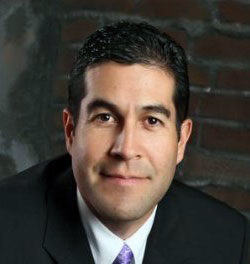(Editor’s note: Jim Boeck wishes to thank his uncle, Abe Baca, for the rich oral history he provided for this column. He also wishes to thank his mother, Cora Boeck, who told him so many stories about her brother, Elue Baca, while Jim was growing up. Special thanks go to Richard Melzer, whose diligent research on the USS Mississippi and the Civilian Conservation Corps was of immense help. For those who want to read more about the CCC in New Mexico, the author recommends Dr. Melzer’s “Coming of Age in the Great Depression: The Civilian Conservation Corps Experience in New Mexico, 1933-42.” This is the monthly column of the Valencia County Historical Society.)
One day, while researching World War II veterans from Valencia County, I started wondering about what had been written about my late uncle, Elue Baca. Elue, who had been killed near the end of the war, had hailed from Belen.
I assumed there surly would have been some sort of local newspaper article about his death in the service of his country. Curiosity got the best of me, and I soon stopped what I was researching and began the search. My only point of reference was the year 1945, the year my mother had mentioned as the time of his tragic passing.
I began the laborious task of reviewing each 1945 issue of the old Belen News, focusing my attention on the column called “Boys in the Service.” The search was soon over: the Thursday, Feb. 1, 1945, issue included Uncle Elue’s tiny obituary.
What I read left me appalled and disappointed. The obituary simply said, “Mr. and Mrs. Orfelio P. Baca of 615 South Main were notified Wednesday that their son, Seaman First Class Eliu [Elue3/8 Baca, was killed in action in the Pacific.” I quickly realized that so many of Valencia County’s servicemen were killed in action in those bleak times that death had become sadly commonplace. But I could not help but feel that Elue Baca deserved more than one sentence in his memory.
My duty as a nephew — and as a historian — seemed clear: write something that would honor Elue Baca’s memory and his Navy service to the United States.
I knew that completing this project would be difficult. For those who survived the war, recall is difficult after 57 years; memories fade into the misty past. Adding to the difficulties, my mother, the former Cora Baca, and her brother, Levi Baca, both now suffer the dreadful effects of Alzheimer’s disease. They had been the family members who had been closest to Elue.
Fortunately, Elue’s younger brother, Abe Baca, who also served in the Navy during World War II, proved to be a wealth of valuable information. Combined with other sources, I was able to piece Elue’s story together from the time of boyhood to the time of his death.
I discovered that Elue was born in 1923 on a ranch in La Joya. His father, Orfelio, was a rancher renowned in the area for his equestrian skills. The Bacas had a total of 13 children, only seven of whom lived beyond childhood.
Ranch life was filled with hard work. When old enough, Elue was kept busy driving cattle across the range and, sometimes, across the Rio Grande, which was a much larger river than it is today. Besides rounding up stray calves and mavericks, Elue became adept with the branding iron.
Elue was a happy boy, especially known for this joyful whistle. Family members and friends always knew that Elue was nearby when they heard his whistle, day or night.
During the Great Depression, Elue and his fellow cowhands often found their livestock butchered on the range. Elue would get mad as hell about the slaughter of his father’s cattle.
But Orfelio, a compassionate soul, would remind Elue that times were hard and people were hungry. Fathers were sometimes driven to do desperate things to feed their families.
There was not much money in the barter economy of rural New Mexico during the Great Depression. And the Baca family felt the financial pinch as did many others. Sometimes they even traded a whole steer for a sack of flour in order to make their tortillas.
With a large family to support and little available cash, Orfelio enrolled Elue and his brother Levi in the Civilian Conservation Corps (CCC) in 1940.
The CCC was a federal government program that offered conservation jobs to unemployed young men from poor families. Paid a dollar a day, members of the CCC sent $25 a month home to help support the rest of their families. This extra income made a great difference to many families in New Mexico and across the United States. With two young men in the CCC, the Bacas were particularly grateful for this New Deal program.
Elue was soon introduced to the paramilitary life of his isolated CCC camp near Magdalena. Enrollees woke to the sound of a bugle or a whistle at 6 a.m. By 6:30, they fell in for roll call, followed by a flag-raising ceremony and calisthenics. After breakfast, they were driven in Army trucks to their work sites in forested areas not far from camp.
At work, Elue labored to conserve the forest by planting trees to sustain the integrity of the wooded terrain. Other duties included constructing hiking trails and truck roads into the remote mountains of western New Mexico. Enrollees also helped extinguish the occasional forest fire.
Life was generally pleasant in the CCC camps of New Mexico, but there were problems to contend with as well. Enrollees from Texas frequently showed disdain for Hispanic enrollees and their culture. Having a hot temper, Elue gave more than one Texan an “attitude adjustment” with his fists.
Elue obeyed most CCC rules, but had trouble with one in particular. Proud of his long auburn hair, he refused to have it cut military style. When ordered to get his hair cut, Elue simply resigned. His days in the CCC had come to an abrupt end, but he had saved his luxuriant locks.
In 1942 Elue was looking for work. He was fortunate to be hired by the Santa Fe Railroad to work in Vaughn, N.M.
Meanwhile, the United States had entered World War II, and Elue knew that it was only a matter of time before he received his draft notice. In 1943 the anticipated notice arrived at his parents’ house in Belen. Elue was instructed to report for induction into the Army.
Perhaps looking at the vast, empty landscape surrounding Vaughn, Elue decided that being a “land pounder” (Army soldier) was not for him. Or perhaps he remembered his Army-like experience in the CCC, when his hair had been threatened just a few years before. Whatever the reason, Elue joined the U.S. Navy rather than face induction into the Army.
Elue completed his boot camp training in Idaho. After additional training, he was assigned to the battleship USS Mississippi (BB41). The ship had already seen combat on July 22, 1943, before Elue had come aboard. The USS Mississippi had bombarded the Japanese-held island of Kiska in the Aleutian Island chain. The Japanese withdrew from Kiska within days after the attack.
Elue’s new ship was now docked at the U.S. Naval Training Station in San Diego, California. Sending a postcard to his sister Cora in Belen, he wrote:
“Dearest Sis,
Just a word or two to say hello. I am on liberty in town, having fun and so forth. So this is all for this time.
Your brother,
Elue Baca.
P.S. This picture is of our camp in San Diego.”
The USS Mississippi sailed out of San Pedro harbor on October 19, 1943, bound for the Gilbert Islands in the Pacific. Elue was assigned to the crew that loaded the ship’s powerful 5″/51 gun, a weapon that could wreck havoc on enemy targets.
Elue and his fellow sailors faced combat conditions a month later. On Nov. 20, during the bombardment of Makin, a turret on the Mississippi exploded, killing 43 sailors. Elue was left shaken by the experience. He fully realized that life was fleeting in war.
Two months later, the Mississippi took part in the Marshall Islands offensive, pounding Japanese-held Kwajalin. On Feb. 20, the ship and its crew bombarded Tarou. They struck the Wotje atoll the following day.
On March 15, the Mississippi’s mighty guns were aimed at Kavieng, New Ireland. After devastating the island, the ship set course for Puget Sound, Washington, for much-needed repairs.
Elue and his fellow crew members looked forward to taking liberty. Elue was especially eager to get ashore because his sister Cora now worked for the Navy at Puget Sound.
With a 30-day furlough to forget about the war for a while, Elue left his ship, whistling, just as he had always done when he was happy. He was still whistling when he knocked on Cora’s door in Bremerton, Wash. Cora had no idea that he was even on shore.
Cora froze before opening the door. She knew that melodious whistle, but thought it couldn’t possibly be her brother. Opening the door, she saw Elue’s bright smile and felt his loving hugs. She was truly surprised.
After a tearful reunion, Elue told Cora of all the places in the Pacific he had been. He also described the amazing scenes of war. He told her, “Sis, when our ship and the other American ships are firing, it looks like a gigantic Fourth of July!”
Elue spotted a piano in Cora’s living room. Having learned to play, he sat down at the instrument, loosened his fingers and began playing boogie woogie music with a lot of soul. Cora would never forget that spectacular private performance.
After a short visit with Cora, Elue was off to see his parents in Belen. Selfa, his mother, immediately noticed that her son had changed. He was old beyond his years. She knew then how much war aged the young.
Meanwhile, back in Washington state, Cora was having a whirlwind romance with a soldier named James H. Boeck. James had just served two years in the frigid Aleutian Islands. In quick fashion, they decided to get married.
Quitting her job, Cora traveled with James to Belen for the wedding. Elue, who was still at home on leave, gladly agreed to be their best man. And Ida Griego agreed to serve as Cora’s maid of honor. The wedding was a happy occasion, especially for Cora because her beloved brother was there for her.
But Elue’s leave was about to end. Before he left, Elue told his mother something that shook her to her very soul. He said, “Mom, don’t be surprised if I don’t come back. It’s really awful out there.”
Crying as she saw her son off, Selfa sensed in her heart that she would never see Elue alive again.
Elue’s new brother-in-law, James, drove the young sailor to the train depot. To this day, James (Boeck’s dad) recalls Elue’s fateful parting words: “I won’t be coming back.”
Elue returned to the USS Mississippi and to hell in the Pacific war. The Mississippi supported landings on Peleliu in the Palau Islands in September 1944.
Next, the Mississippi assisted in the liberation of the Philippines. The ship shelled the east coast of Leyte on Oct. 19, helping General Douglas MacArthur fulfill his 1942 promise to someday return to the Philippines.
On the night of Oct. 24, the Mississippi, along with other U.S. battleships, destroyed a Japanese naval force at the Battle of Sariago Strait.
The Mississippi sailed from San Pedro Bay in the Philippines to Lingayen Gulf during the first week of January, 1945.
On Jan. 6, somewhere in the Philippines, a kamikaze pilot was receiving his final orders for his impending suicide mission. He had no problem in laying down his life for his emperor and his country because it was a fundamental part of the Japanese military culture.
As that young pilot took off on what would be his last flight, perhaps he thought about his family and loved ones, just as Elue and every American soldier and sailor often thought of theirs. But the Japanese pilot knew his main objective that day was to sink an American ship, no matter how many sons or brothers or sweethearts were on board.
Meanwhile, Elue and his fellow sailors were firing their 5″/51 cal casemate guns, bombarding Lingayen Gulf on the Philippine coast. The determined Japanese pilot spotted their unsuspecting ship and began his swift suicidal dive at the Mississippi.
Alerted, the gun crews fired frantically at the incoming kamikaze plane that was hell-bent on their destruction. The resolute enemy pilot quickly closed the gap between his plane and the ship, evading the anti-aircraft explosions dotting the sky around him. None of the American shots hit their mark.
The Japanese pilot and his plane crashed near the 5-foot gunmount, damaging the hull of the ship near its water line. Elue was engulfed in fire, fatally burned over most of his body. The hair he had cared so much about was burned off. He lived for only three hours. His last words to the Naval doctor were, “Will my hair grow back?”
Sadly, on that fateful day, two mothers, an ocean apart, lost their sons for the causes they believed in and the nations they defended.
That same night, in far-off Belen, Cora was staying with her mother while her newlywed husband, James, served overseas on a second tour of duty. Mother and daughter were in their living room, when, suddenly, they both heard Elue’s melodious whistling outside.
The two women rushed to the door and flung it open, expecting to greet Elue. But there was no one there. Feeling a deep emptiness, they sensed that their beloved Elue was gone. He was only 21 years old.
Elue Baca was buried at sea in January, 1945. For many years, his mother and sister tossed flowers into the Rio Grande on Veterans Day. Water was where Elue had worked as a boy and had died as a sailor. They remembered Elue the best way they could, but they would never hear the sweet sound of his youthful whistle again.
(Jim Boeck of Belen has a master’s degree in history.)
The Valencia County News-Bulletin is a locally owned and operated community newspaper, dedicated to serving Valencia County since 1910 through the highest journalistic and professional business standards. The VCNB is published weekly on Thursdays, including holidays both in print and online.
















